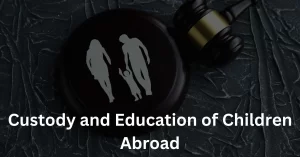The parents had initially agreed to send their children abroad for further studies, but disagreements emerged later. The court’s decision and the arguments presented by both the mother and father are examined.
Background of the Case
The case was brought before the Family Court (South) Saket, where the father had filed a Guardianship Petition seeking custody of the children under the Guardian and Wards Act, 1890. The mother filed an application requesting directions for admitting the children to schools in the UK. The court allowed the father to proceed with the admission process and interacted with the children to gauge their preference. The father later filed an application regarding the children’s admission to schools in the UK, seeking directions to secure admissions and relocation for both children.
Family Court’s Decision
The Family Court, in its decision, permitted the children to study abroad for further studies. The son, Master Nathan Kartikey Dubey, was allowed admission to Loughborough Grammar School, UK, while the daughter, Ms. Ananya Dubey, was permitted to join Badminton School, UK. The court instructed the father to bear the expenses of their education, boarding, and lodging. The mother was granted visitation rights during school vacations, and her expenses for one visit to the UK were to be borne by the father.
Wife’s Arguments
The appellant mother, Sara Carriere Dubey, insisted that both children be admitted to the same school in the UK. She expressed concerns about the children suffering from psychological trauma due to separation and urged relocation near the schools. She requested the father to bear her relocation expenses.
Husband’s Arguments
The respondent father, Ashish Dubey, opposed the mother’s request for admission to the same school, arguing that the children were enthusiastic about studying abroad. He maintained that the children’s admissions were based on their performance in the assessment test.
High Court’s Observations and Decision
- During the proceedings, the court interacted with the children, who expressed their strong desire to study abroad and have worked hard to secure admission in their respective schools.
- The court observed that the mother’s apprehension about the children suffering from psychological trauma is unfounded and based on her own fears and anxieties.
- Considering the overall circumstances and the children’s wishes, the court ruled that their admission in the UK schools should not be hindered by insisting on getting them admitted to specific schools in Delhi or the same school abroad.
- The court found no issue with the children being permitted to join schools in the United Kingdom.
- The appellant argued that the children, being of tender age, cannot be left alone in a foreign country, and she sought to relocate near the UK schools for their care, with expenses to be borne by the respondent father.
- The court acknowledged the mother’s concerns but pointed out that she initially agreed to let the children study abroad and their welfare won’t be compromised by studying away from parents.
- The court stated that the mother can visit the UK and make her arrangements without claiming expenses from the respondent.
- The court declared that the Guardianship Petition is not the appropriate platform for the mother’s relocation claims, as it has already made provisions for her to visit the children once a year.
- The appeal was dismissed for lacking merit.



